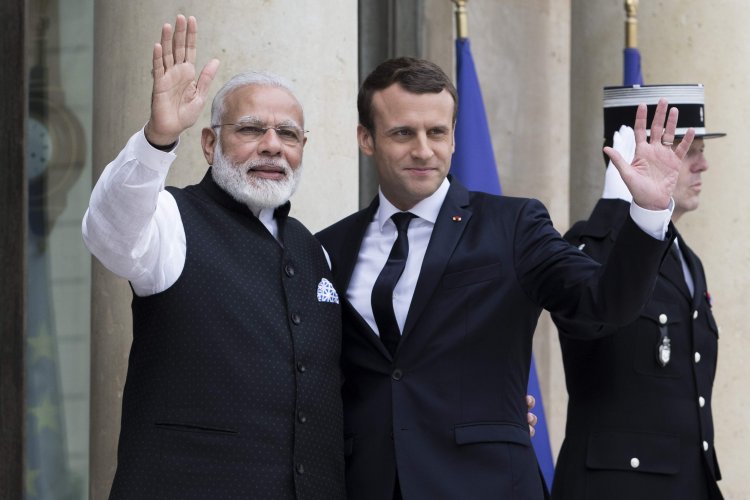India - France: Significance of Macron as Republic Day Chief Guest
STORIES, ANALYSES, EXPERT VIEWS

President Emmanuel Macron has accepted Prime Minister Narendra Modi’s last-minute invite to be the Republic Day chief guest after US President Joe Biden conveyed his unavailability. His predecessor, Francois Hollande, was the chief guest in 2016. It was in 1976 that then Prime Minister Jacques Chirac had become the first French leader to be invited as the R-Day chief guest; he was also accorded the honour in 1998, when he was the President.
The choice of Macron, writes The Tribune “is guided not only by strategic and diplomatic imperatives but also the depth of bilateral engagement.” It also “signals a high point for India-France ties.”
25th anniversary of ‘strategic partnership’
Prime Minister Modi was the guest of honour at the Bastille Day Parade in Paris in July. It will be the sixth time a French leader will be the chief guest at the R-Day celebrations. India and France elevated their diplomatic relationship to ‘strategic partnership’ in 1998. This year marks its 25th anniversary.
Cooperation in the defence sector
President Macron’s confirmation “reiterates France’s status as a reliable, all-weather friend. During PM Modi’s visit, the joint statement highlighted the shared values and belief in sovereignty as well as strategic autonomy. High on the agenda was cooperation in the defence sector. That is expected to be the focus this time round too. Even as a massive push is being given to the indigenous defence industry, India is seeking to diversify its military trade partners. After the acquisition of Rafale jets for the Indian Air Force, the Defence Acquisition Council in July approved the purchase of 26 Rafales for the Navy and three Scorpene submarines, developed by France and Spain. New Delhi is eyeing greater engagement with France for co-production, co-development and co-design of military hardware.”
France writes The Tribune “has emerged as one of India’s closest partners in Europe. A standout feature has been the eagerness on both sides for a mutually beneficial convergence. The bilateral talks will give the two leaders an opportunity to review the progress made on the key pillars of the strategic partnership, including space, climate change, security, civil nuclear technology and resilient supply chains.”
France will not to let India relations affect its relations with China or Pakistan
According to Vivek Katju (former Secretary, Ministry of External Affairs) “while France wishes to develop its ties with India, it will take care not to let their growth affect its relations with China or Pakistan. France is against terrorism in the context of Pakistan and is also a strong advocate for freedom of the seas, including in the South China Sea. However, that does not mean it will lean towards India on issues relating to its problems with Pakistan or China. Delhi has the maturity not to let these French approaches adversely impact the growth of its ties with Paris.”
France wants to prioritise its economic and strategic interests in India
Nevertheless, France has “opted to prioritise its economic and strategic interests in India. And, going by media reports, France is in contention for major defence acquisitions planned by India. Naturally, India will be governed by its interests and will buy only that equipment which meets its needs and at appropriate prices, but Macron may well consider his response to the invitation as ‘facilitation’. French diplomacy has always had a strong practical streak. This was also visible in its milder negative response to India’s nuclear tests of 1998 than those of other Western powers.”
Besides, “the acceptance of the invitation at short notice shows that there is a good equation between Macron and Prime Minister Narendra Modi. This is also borne out by the fact that departing from the protocol, the invitation has been extended by PM Modi instead of President Droupadi Murmu. Modi and Macron have met on numerous occasions bilaterally as well as on the sidelines of multilateral events after the latter took charge as the President in 2017. In the context of their meetings, Macron’s state visit to India in March 2018 was significant. Both countries decided to give special attention to their cooperation in space. They also signed an agreement to cooperate in the Indian Ocean Region. Modi visited France in August 2019, when a ‘roadmap’ on cybersecurity and digital technologies exchange was finalised.”
Both leaders have also discussed the regional and international situations during their interactions. And, these have undergone great changes since Macron won his first term in 2017; he also won the 2022 presidential election. Under the French Constitution, a President can only have two five-year terms; hence, Macron will be in office till 2027. He came to India for the G20 meeting in New Delhi in September.
It can be expected that the Israel-Hamas and the Ukraine war will be discussed among other subjects.
















